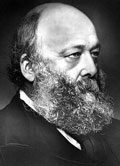 |
Robert Arthur Talbot Gascoyne-Cecilb. 3 Feb 1830, Hatfield House, Hertfordshire |
| Ministerial offices: | Secretary of State for India (6 Jul 1866 - 8 Mar 1867, 21 Feb 1874 - 1 Apr 1878) |
| Secretary of State for Foreign Affairs (2 Apr 1878 - 21 Apr 1880, 23 Jun 1885 - 28 Jan 1886, Jan 1887 - 11 Aug 1892, 25 Jun 1895 - 12 Nov 1900) | |
| Leader of the House of Lords (Jun 1885 - Feb 1886, Aug 1886 - 11 Aug 1892, 25 Jun 1895 - 11 Jul 1902) | |
| First Lord Commissioner of the Treasury (25 Jul 1886 - 11 Aug 1892) | |
| Lord Privy Seal (Nov 1900 - 11 Jul 1902) | |
| Names/titles: | Lord Robert Cecil [until 14 Jun 1865]; Viscount Cranborne [from 14 Jun 1865] and Baron Cecil of Essendom; 3rd Marquess of Salisbury and 9th Earl of Salisbury [from 12 Apr 1868] |
| Biography: | |
Lord Robert Cecil was the third son of the 2nd Marquess of Salisbury, who served as Lord Privy Seal and Lord President of the Council under the Earl of Derby. He was educated at Eton and Christ Church, Oxford, receiving a degree in mathematics. In 1853 Cecil was elected MP (1853-1868) at the age of 23 after a protracted world tour learning about problems in the British Empire. He published his rigorous conservative ideas in articles in the Quarterly Review. After his elder brothers died, Cecil succeeded his father as the 3rd Marquess of Salisbury in 1868 and took a seat in the House of Lords. He held the post of Secretary of State for India twice (1866-1867, 1874-1878) and this was followed by promotion to Foreign Secretary (1878-1880) under Benjamin Disraeli where he shared in the prime minister's success at the Congress of Berlin in 1878. After the death of Disraeli Salisbury became Leader of the Opposition in the House of Lords. In 1881-1885 he was the Joint Leader of the Conservative Party with Sir Stafford Northcote (created the 1st Earl of Iddesleigh in 1885). When the Gladstone's Government fell after a vote on the Budget, Salisbury reluctantly accepted an invitation to form an administration (23 Jun 1885), in which he assumed the portfolio of Foreign Secretary leaving the office of First Lord of the Treasury for Earl of Iddesleigh (1885-1886). He also became Leader of the Conservative Party (1885-1902). Salisbury's first administration included legislation on housing the working class. After no party obtained an overall majority (Liberal 319, Conservative 249, others 102) in the 1885 General Election, the Salisbury's government was defeated (27 Jan 1886) when Liberals and Parnellites voted against an agricultural measure. Salisbury resigned on 28 Jan 1886. Following the 1886 General Election (Conservative 393, Liberal 192, others 85), called over the Irish question, the Conservatives became the largest party in the Commons, and Salisbury was appointed First Lord of the Treasury and prime minister on 25 Jul 1886. The Government was formed by an alliance of the Conservatives and Liberal Unionists. In his second administration Salisbury included important reforming acts, introducing elected county councils to improve local government (Local Government Act, 1888) and providing for free elementary education (Free Education Act, 1891). After the death of Earl of Iddesleigh (12 Jan 1887), who was the Foreign Secretary in 1886-1887, Salisbury again took over as Foreign Secretary (1887-1892) bringing great experience to the office when foreign affairs were crucial. Abroad, Rhodesia was established and a settlement with regard to Africa reached with the other imperial powers of France, Germany and Portugal. The 1892 General Election resulted in a loss of 80 seats for Conservative MP's (Conservative 313, Liberal 272, others 85) and Salisbury tendered his resignation on 11 Aug 1892. After the Liberal Government of Earl of Rosebery was defeated on a vote on the Army Estimates, Salisbury was entrusted (25 Jun 1895) to form his third administration as Foreign Secretary and prime minister. His nephew, Arthur James Balfour, assumed the office of First Lord of the Treasury (1895-1905). In home affairs, the Salisbury's Government passed the Workmen's Compensation Act (1897), making the employer liable for accidents at work, and Local Government for Ireland Act (1898). In October 1899 Britain entered the war with the Boer republics in South Africa. The 1900 General Election returned Conservatives to power with a reduced majority (Conservative 402, Liberal 183, Labour 2, others 83). In failing health, Salisbury handed over the Foreign Office to Lord Lansdowne and became Lord Privy Seal (1900-1902), also continuing as prime minister. He was confirmed in his office after the death of Queen Victoria (22 Jan 1901) and the accession of Edward VII. The Treaty of Vereeniging (31 May 1902) concluded the Boer War, but Salisbury resigns (11 Jul 1902) on the grounds of ill health. Biography source: [1, pp. 205-211]. |
|
| | |
| [1] | Englefield, Dermot; Seaton, Janet; White, Isobel (eds.) Facts About the British Prime Ministers: A Compilation of Biographical and Historical Information. New York: The H.W. Wilson Company, 1995. online |
| Image: photograph of the 3rd Marquess of Salisbury, c. 1900. | |
